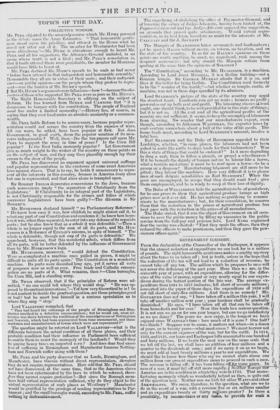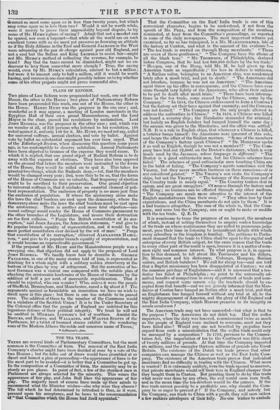GOVERNMENT ECONOMY.
FROM the declaration of the Chancellor of the Exchequer, it appears that the utmost reduction of expenditure we can look for is a million jI of pounds. The right honourable gentleman makes a mighty mystery about the taxes to be taken off; but in truth, unless in the hope that the reduction of the tax will not lead to a reduction of revenue, he ; cannot take off any tax. The million which he proposes to save will not cover the deficiency of the past year. Here then w a are, in the I sixteenth year of peace, with an expenditure, allowing for the differ- ence of the value of money, equal or very nearly equal to our expen- diture during the hottest portion of the late war. The average ex- t penditure from 1804 to 1813 inclusive, fell short of seventy millions ; converted into the paper of those days, the expenditure of 1830 will not fall short of sixty-five millions. And there is no remedy! Mr. GOULBURN does not say, "I have taken off a million this year, I will take off another million next year ; your burdens shall be gradually diminished." He says, "I have taken off all that can be taken off from henceforth and for ever." Now this leads to a serious question. It is not can we go on for one year longer, but can we go indefinitely as we are doing? The peace we now enjoy, is the longest we have enjoyed since WALPOLE'S time : how much of it is gone ? One half? two thirds ? Suppose war to come, it matters not when—in a dozen of years, or in twenty years—what must ensue ? We must borrow not only for the current expenses of the war, but for the outfit. In 1814, 1815, and 1816, our loans and Exchequer bills amounted to one hundred and forty millions. If we begin the next war on the same scale that we left off the last, we shall have an addition of four millions and a quarter to the dividends at once ; and if we carry it on as we begin, we must add at least twenty millions a year to our expenditure. We should like to know how those who say we cannot abate above one million from our present expenditure mean to proceed in such a case. The revenue is falling off; it has been falling o r some ears. In. case of a war, it must fall off still more rapidly. Nei er urope no America are in the condition in which they were n 1793. That manu- facturing monopoly which so wonderfully helped us then, is quite out of the question now. Neither can we look for other WATTS and other ARKWRIGHTS. We recur, therefore, to the question, what are we to do in the event of a war, with a revenue five or six millions smaller and an expenditure twenty or thirty m4lions greater? Is there a possibility, by income-taxes or any taxes, to provide for such 'a &sand as must come upon us in less than twenty years, but which may come upon us in less than two? Would it not be worth while, were it merely to prove their impossibility beyond dispute, to try some of Mr. HUME'S plans of saving ? Admit that not a musket can be spared, nor even a bayonet—that while all 'the world are on such excellent terms with us we must yet preserve as frowning an attitude as if the Holy Alliance in the East and General JACKSON in the West were advancing at the pas de charge against poor old England, and not a soul but the Sultan and King LEOPOLD to assist her—might not Mr. HUME'S method of collecting the revenue, for example, be tried? Say that the taxes cannot be diminished, might not we en- deavour to levy them somewhat more cheaply? True, the saving would, even by Mr. Hums's calculation, amount to but a million ; but were it to amount only to half a million, still it would be worth having, and success in one case might possibly induce us to try whether some of his other projects might not prove successful also.



















 Previous page
Previous page